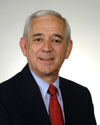


|
Foundation rewards teaching excellenceThree faculty members will receive the 2001 Health Sciences Foundation Teaching Excellence Awards during Fall Faculty Convocation on Aug. 22.They are being announced now for the benefit of the faculty and graduating students who nominated 55 candidates for the three categories of awards. Chosen from those nominees, this year's recipients are Kathryn E. Meier, Ph.D.; Philip J. Privitera, Ph.D.; and Michelle Woodbury, MA. The three recipients deserve our highest praise for the contributions
they have made and continue to make to our educational mission. They have
touched the lives of innumerable students and serve as role models to their
colleagues.
Valerie T. West, Ed.D.
Kathryn E. Meier Kathryn E. Meier, Ph.D. will receive the Educator-Mentor award for excellence in mentoring and role modeling.  An
associate professor in the Department of Cell and Molecular Pharmacology,
Meier joined the MUSC faculty in 1991. She was nominated by MSTP student,
Stewart Knoepp for whom Meier has served as a mentor and Ph.D. advisor. An
associate professor in the Department of Cell and Molecular Pharmacology,
Meier joined the MUSC faculty in 1991. She was nominated by MSTP student,
Stewart Knoepp for whom Meier has served as a mentor and Ph.D. advisor.
In his letter of support, Knoepp wrote that Meier “has inspired me to devote my life to science through the investigation of disease mechanisms.” He describes her as a “consummate scientific and professional role model” and a professor who “does not micromanage her students, but rather instills in them the knowledge that success is their responsibility and their undertaking.” It is clear from his support letter that Meier exhibits a respect for all students and a willingness to give generously of her time to inspire student learning. Meier is currently the principal investigator on two large Department of Defense grants, including an Idea Development Award, “Phospholipase D as a novel therapeutic target in prostate cancer,” and a Program Project Award, “Lysophosphatidic acid in ovarian cancer cells.” She lectures in nine courses, is the course director for a graduate course in scientific writing, is an examiner in the Parallel Curriculum, and mentors graduate and post-doctoral students. Her advisees and trainees have been successful in obtaining awards and prestigious positions. In her statement of philosophy, Meier says “I was fortunate to be trained by exceptional mentors and teachers, and I seek to follow their example in this very gratifying career.” This award acknowledges her success in carrying forward the example of her mentors while inspiring future mentors and teachers. Philip J. Privitera Philip J. Privitera, Ph.D., professor of Pharmacology, will receive the Educator-Lecturer award for excellence in classroom teaching. Privitera has received multiple teaching awards, including the College of Medicine’s Golden Apple Award for teaching excellence in 1996, 1998 and 2000. He was nominated for the Golden Apple eleven times in the past twelve years.  Privitera
serves as course director for the medical pharmacology course and lectures
in both the College of Pharmacy and College of Dental Medicine. In addition,
he participates in the Parallel Curriculum of the College of Medicine as
both a small group facilitator and evaluator. Privitera
serves as course director for the medical pharmacology course and lectures
in both the College of Pharmacy and College of Dental Medicine. In addition,
he participates in the Parallel Curriculum of the College of Medicine as
both a small group facilitator and evaluator.
Privitera was nominated by his chair, John Hildebrant; several colleagues, Steven Rosenzweig, Daniel Knapp, Jerry Webb, and Elizabeth Bradley; and seven students, Alicia Tolbert, Matthew Whitten, Lauren Hall, Alema Galijatovic, Jonathan Bridges, Ricky Choi, and Laura Bolchoz. Colleagues of Privitera laud the core medical course in pharmacology that he has refined and developed to be a top rated basic science course. They praise his contributions to the College of Medicine’s parallel curriculum, where he has been a contributor since its inception. As described by Bradley, “his thirst for knowledge was apparent as he probed for depth of understanding…he genuinely cares about his students….he has been and will continue to be a true educator in all sense of the word.” Students describe his skill as a course director, his ability to make complex material understandable, his enthusiasm for learning and encouraging students to think, and his genuine interest in and availability to students. By working in his laboratory, Galijatovic observes, “I witness daily the impact Dr. Privitera has on the lives of many students that come to see him and seek help in understanding the concepts in pharmacology.” She states that “his enthusiasm for teaching and genuine interest in students are an inspiration for students such as myself to pursue a career in academics.” Bridges adds, “In the classroom there is no one more capable of holding an audience… a testament to his talents is how I can still vividly remember his lessons and apply them to my clinical work in the hospital a year after the course.” In his nomination letter, Hildebrandt states that “while the faculty are proud of the contributions which the entire Department of Pharmacology makes to the education of students at the Medical University of South Carolina, each of us know that Phil Privitera is, and has been, responsible for setting the standard by which we judge our own performance.” Michelle Lynne Woodbury
|